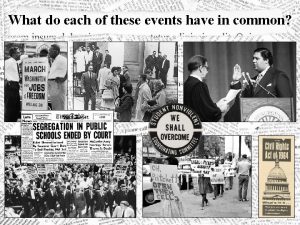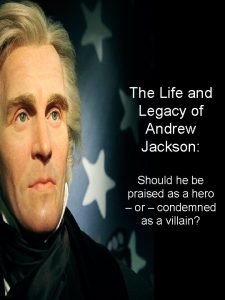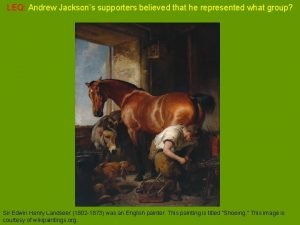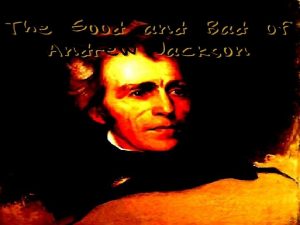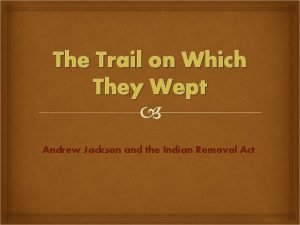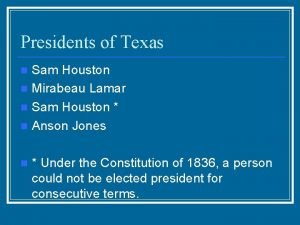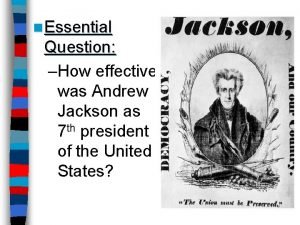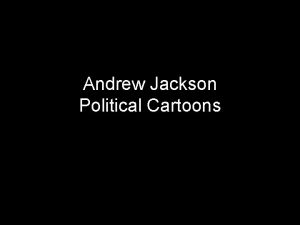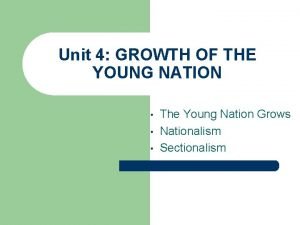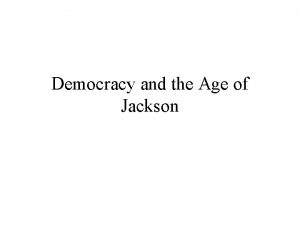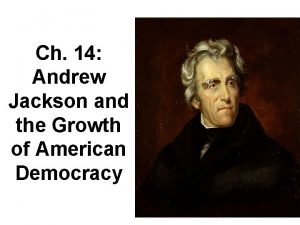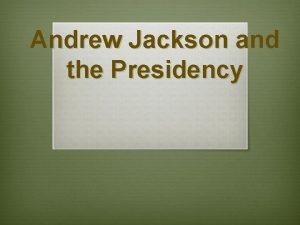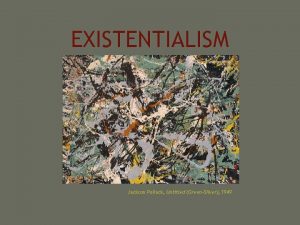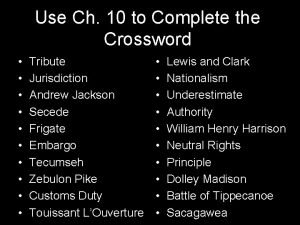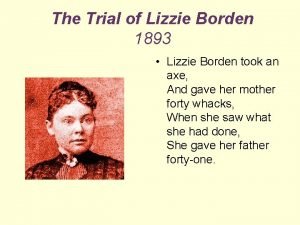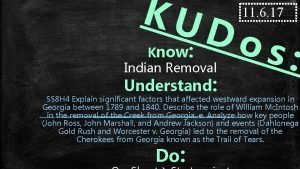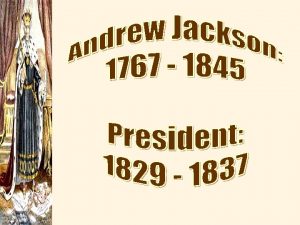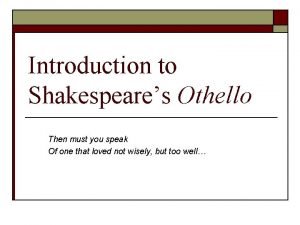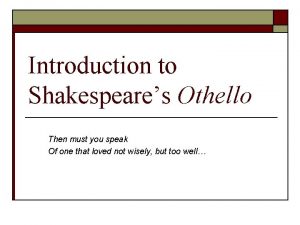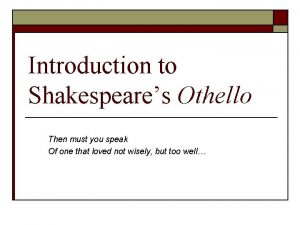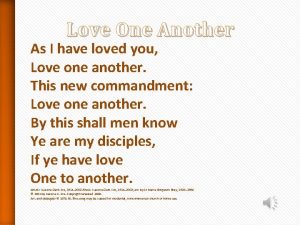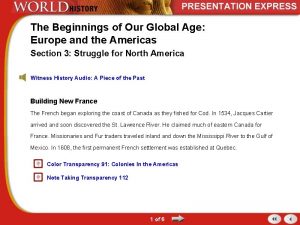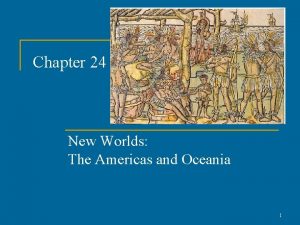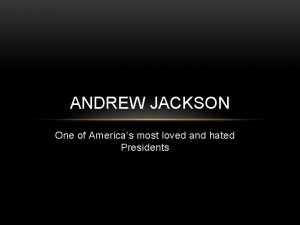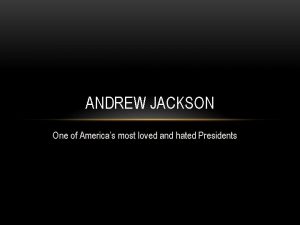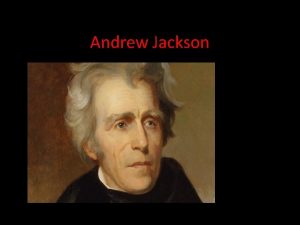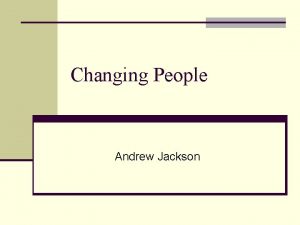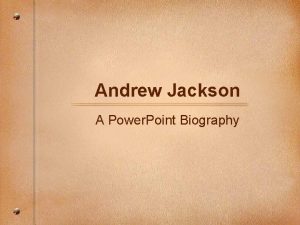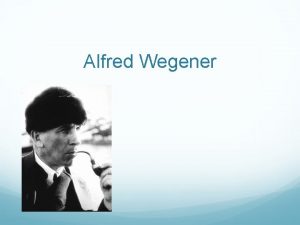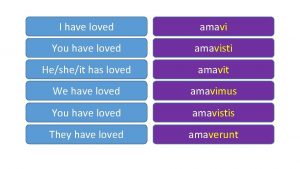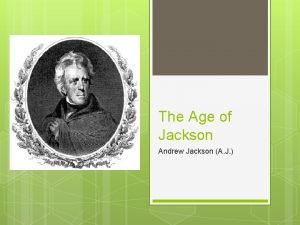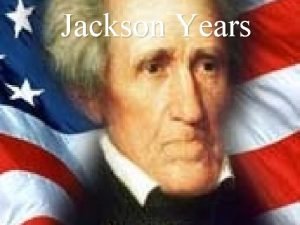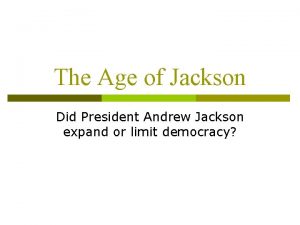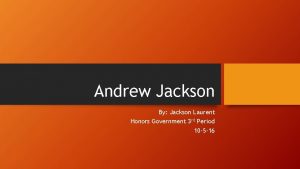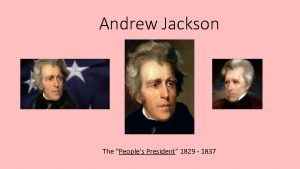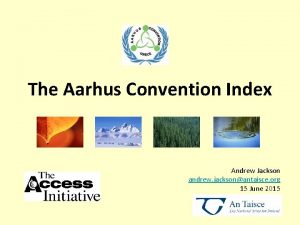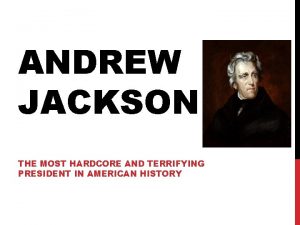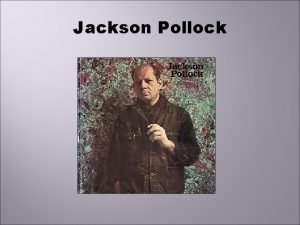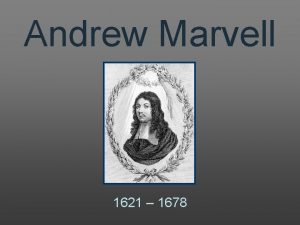ANDREW JACKSON One of Americas most loved and

































- Slides: 33

ANDREW JACKSON One of America’s most loved and hated Presidents

WHAT WE ALREADY KNOW ABOUT JACKSON • Homegrown man born in a log cabin • Military history: American Revolution-War of 1812 • Takeover of Spanish Florida • Crazy Duels, Gambling, Military Tyranny • Protection of Women at all costs • Loses Presidency in “Corrupt Bargain” of 1824

RISE OF A DEMOCRATIC SOCIETY 1830 S • Mixed classes • Ate together at hotels • One-class travel • Widespread belief in “equality” • White males • “self-made” • Feminists come later

CHANGE IN POLITICS • Who dominated politics from 1790 s-1820 s? • BIG CHANGES • Lower and middle class participation • State suffrage laws • Political parties • Campaign methods • Improved education • Newspaper circulation

ELECTION OF 1828 “JQA who can write” “Andy J who can fight”

ELECTION OF 1828 • Adams seeks reelection • “Elitist, unpopular, not right for the common people” • Jacksonians have new campaign method: MUDSLINGING • Smearing the President’s name, retaliating with negativity • Jackson: “Adams uses public funds for personal luxuries!” • Adams: “Jackson’s wife committed adultery!” • 3 x number of voters participated compared to 1824 • Jackson wins easily • Master political campaign organizer • Carries all western states; “war hero and a man of the western frontier”

“OLD HICKORY”, A MAN OF THE PEOPLE • Our first “self-made” president • Famous self-trained general • Symbol of the working class • No college education • Against the rich • Frugal Jeffersonian; limited federal power, states rights

JACKSON, BY JOHN MARSZALEK 1. How does Marszalek describe Jackson? Why does he state that Jackson could never be elected during our time? 2. What happened to Rachel Jackson? How did it affect President Jackson? 3. Give 2 examples of Mudslinging. 4. What makes Jackson a nationalist? What about a defender of state’s rights? 5. What was the Petticoat Affair? How did it impact Jackson? 6. What was rotation in office and how was it used during Jackson’s Presidency?

REVIEW: • Name 2 events that promoted nationalism in the Era of Good Feelings. • Name 2 ways that society was becoming “more democratic” by the 1830 s. • In what ways did Jackson portray himself as a “common man”?

POLITICS OF THE COMMON MAN • Universal Male Suffrage • No more property/religious qualifications • Party Nominating Conventions and Popular Election of President • Voters choose a state’s slate of presidential electors • Two Party System • Whigs & Democrats solidify • Campaign on a large scale basis • Rise of 3 rd parties • New political concerns • More Elected Offices • Popular Campaigning • Role of the President • Limited (sorta) • Spoils System/Rotation of Offices • “More Opportunity” • Giving out government jobs in return for party loyalty



THE NULLIFICATION CRISIS • Supported states rights but not disunion • Jackson continues policy of protective tariffs by supporting the 1828 Tariff of Abominations • South Carolina (and South) is unhappy, declares tariff unconstitutional • John C. Calhoun proposes nullification

JOHN C. CALHOUN: AN INTRODUCTION • Originally a Presidential candidate; settled for Jackson’s VP • Agreed with 1828 Tariff; changed opinion because it hurt the agrarian south • Advocated for nullification instead of secession • Joined with Clay later on with the Compromise Tariff • Left VP position after Jackson’s first term

NULLIFICATION CRISIS • 1832: SC holds special convention to nullify Tariff of 1828 and 1832 • Jackson: Force Bill • Military action is not taken; Congress negotiates and lowers tariff; SC backs down • Impact: Strong defense of federal authority • Foreshadowing: antislavery alarm a growing concern


JACKSON VS. THE NATIONAL BANK • Jackson is weary of the national bank • Hard money v. soft money; Constitutionality; Power • National Bank (1816) v. State Banks (Panic 1819) • Congress proposes renewing the bank for 20 years • Clay-Webster political ploy • Bill passes but Jackson vetoes the bill • Jackson destroys the bank (though its charter had not expired) and invests the money in state banks


ANDREW JACKSON’S REAL ABOMINATION • Sympathized with land-hungry Americans • Most humane solution: compel all American Indians to resettle west of the Mississippi • Pushed Congress to approve the Indian Removal Act, funding the government’s forced relocation of American Indians • 1836: Bureau of Indian Affairs created

JACKSON’S SPEECH TO CONGRESS “It will separate the Indians from immediate contact with settlements of whites; free them from the power of the States; enable them to pursue happiness in their own way and under their own rude institutions; will retard the progress of decay, which is lessening their numbers, and perhaps cause them gradually, under the protection of the Government and through the influence of good counsels, to cast off their savage habits and become an interesting, civilized, and Christian community. ”


INDIANS FIGHT BACK • The Cherokee, one of the five civilized tribes, fought back in the American way– sues the government • Precedents set by Chief Justice John Marshall • Cherokee Nation v. Georgia, 1831: Tribal Sovereignty • Worcester v. Georgia 1832: GA laws had no force in Cherokee Territory • GA ignores ruling…Federal Court v. State Laws

ANDREW JACKSON’S RESPONSE TO JOHN MARSHALL— “JOHN MARSHALL HAS MADE HIS DECISION, NOW LET HIM ENFORCE IT. ” WHAT DOES THIS MEAN? SIGNIFICANCE?

JACKSON AND AMERICAN INDIANS • Essentially, Jackson ignores the Supreme Court and ignores the checks and balances that are supposed to limit his power • Extreme racism at the time; many supported Jackson and he was never held accountable • VP, then President Martin Van Buren enacts the Trail of Tears because of the Indian Removal Act • 15, 000 Cherokees removed; 4, 000+ deaths


READ: PRIMARY SOURCES OF INDIAN REMOVAL

REVIEW: JACKSON 1. Give 3 examples of how politics changed to support the common man. 2. What sections of the country supported Jackson? Why? 3. Give an example of how Jackson supported the federal government. 4. Give an example of how Jackson supported the state government. 5. Why might the Election of 1828 be considered a revolution? 6. How did Jackson change the role of the president? Use the following events to support your answer. 1. Tariff of Abominations/Nullification Crisis 2. Bank War 3. Indian Removal/Worcester v. GA

POLITICAL PARTIES • Jackson’s followers call themselves the Jacksonian Democrats, or just the Democrats • Those who disliked Jackson called him “Jackass”… • New Party led by Clay: called themselves the “Whigs” to mirror the English anti-monarchist party



POLITICAL PARTIES Democrats: Jackson Whigs: Clay • Local rule • American System • Limited government • Opposed immorality, vice and crime • Free trade • Equal economic opportunity • Opposed monopolies, national bank, high tariffs, and high land prices • Southerners, westerners, small farmers, urban workers • New Englanders, mid Atlantic/upper Middle. Western states, Protestants, middle class urban workers

JACKSON: A COMMON MAN? DEBATE Andrew Jackson claimed throughout his presidency to be a proponent of the “common man” but did he reflect that title? YOU DECIDE! Using the information in you notes, readings, and textbook, argue your team’s stance on Jackson’s presidency. To what extent was Andrew Jackson truly a common man?

COMMON MAN DEBATE Questions to Consider Events to Consider • Was he a reflection of the new democracy emerging in the country? • Jackson’s background (home life, growing up, Revolutionary War, War of 1812, Indian battles, dueling) • How might he have influenced this new ideology himself? • Personality traits • How do we measure Jacksonian Democracy in light of his treatment of groups such as Native Americans or Slaves? • National Bank Veto • Universal male suffrage • Indian removal • Pet banks • Nullification Crisis • Peggy Eaton Affair • Spoil System & Rotation of office holders
 I love him because he loved me first
I love him because he loved me first Albany movement
Albany movement The life and legacy of andrew jackson
The life and legacy of andrew jackson Andrew jackson and his supporters believed in apex
Andrew jackson and his supporters believed in apex Who is in this picture
Who is in this picture Andrew jackson trail of tears map
Andrew jackson trail of tears map Mirabeau lamar slogan
Mirabeau lamar slogan Andrew jackson accomplishments
Andrew jackson accomplishments Andrew jackson political cartoons
Andrew jackson political cartoons Why did andrew jackson oppose the national bank
Why did andrew jackson oppose the national bank Quotes about the trail of tears
Quotes about the trail of tears Andrew jackson found his greatest support among
Andrew jackson found his greatest support among When was andrew jackson inaugurated
When was andrew jackson inaugurated Jacksonianism
Jacksonianism Champion of the common man
Champion of the common man Andrew jackson
Andrew jackson Andrew jackson pollack
Andrew jackson pollack Andrew jackson crossword puzzle answer key
Andrew jackson crossword puzzle answer key Lizzie borden bridget sullivan
Lizzie borden bridget sullivan Who signed the indian removal act of 1830
Who signed the indian removal act of 1830 Election of 1824
Election of 1824 The jackson era vocabulary
The jackson era vocabulary Stumphole whiskey
Stumphole whiskey Elegy poem short
Elegy poem short Iambic pentameter othello
Iambic pentameter othello Then must you speak of one that loved
Then must you speak of one that loved Tragic character
Tragic character Questioning god about death
Questioning god about death Love your neighbor as i have loved you
Love your neighbor as i have loved you Then must you speak of one that loved
Then must you speak of one that loved A list of love languages
A list of love languages Twelfth night speeches
Twelfth night speeches The beginnings of our global age europe and the americas
The beginnings of our global age europe and the americas Chapter 24 the americas and oceania
Chapter 24 the americas and oceania

